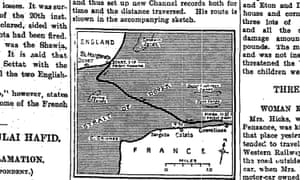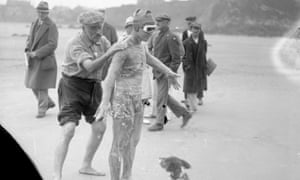
The tug Gnat, with T. W. Burgess, the Yorkshire long-distance swimmer, and the party who had accompanied him in his attempt to swim across the Channel, returned at four o’clock on Saturday, Burgess having, after a great effort extending over 22¾ hours, failed in his object one and a half mile off Gravelines, between Calais and Dunkerque, in the neck of the North Sea. He had covered over 60 miles, and thus set up new Channel records both for time and the distance traversed. His route is shown in the accompanying sketch.

Swimming on five times
Owing to Burgess being drifted into the North Sea the swim extended to five tides, three complete tides being taken and two sections of ebb tides at the start and finish. This is notable considering that Burgess is a fast swimmer who has finished next to Jarvis on various long swims. The peculiarity of the Channel tides is strongly evidenced by the extraordinary divergence of the courses of Burgess’ 20h. 11min. swim which finished on Tuesday and this last attempt. Burgess made his start with the object of securing the same course, allowing for the different time of tide when the start was made. But whilst in the case of the previous swim he was drifted as far westward as Dungeness and Boulogne, on this occasion the extraordinary eastward drift took him as far as Gravelines.
The earlier stages of the swim, which was started at twelve minutes past 1 a.m. from St. Margaret’s Bay on Friday, were dealt with in our issue on Saturday. Burgess’s furthest westward drift was in a direct line with Dover Admiralty Pier when he was five miles out to sea. The strong westerly wind which developed from that time onward held up the ebb tide so effectually that Burgess never again got west of the line between the South Foreland and Cape Blancnez. Right throughout the day he encountered very heavy seas, which must have caused him considerable discomfort, as they broke over him continuously. Between half-past six and seven Calais appeared so near that Burgess got his pilot to test the tides in order to judge whether it would be possible to get in by a sprint. The tide, however, was found to be running strongly parallel with the coast, and as at this time the swimmer was about three and a half miles from the shore east of Calais it was judged advisable not to attempt sprinting in order to accomplish the object. Bearings at eight o’clock proved that the nearest point was Calais Piers, three miles ahead. At half-past nine this distance had been reduced to one and a half mile by strenuous swimming on the part of Burgess, who since nine o’clock had been accompanied in the water by Weidman, of the Dover Swimming Club. Weidman remained swimming with Burgess from this time right to the end.
Wind from the land
It was one long struggle in the darkness to endeavour to make the French coast at some point between Calais and Gravelines, and at one time it looked as though Burgess would have an excellent opportunity of landing at Walden, about midway between these two ports. Naturally, however, he was not swimming with the same vigour as in the earlier part of his effort, and the tide making along the coast gradually set him towards Gravelines. During the last half hour the wind chopped round and blew directly off the land. Although a sea anchor was used in the endeavour to keep the tug up to the course to be followed by the swimmer, it was impossible to do so at the speed she had to be run to accompany him. Burgess, therefore, abandoned the attempt, climbing up the ladder and on to the tug at three minutes to twelve o’clock. His pulse was taken as soon as he got on board the tug and found to be 85, whilst his temperature was 97.3. During the whole of this long swim Burgess’s only nourishment consisted of cold chicken, bovril, and grapes, with an occasional cup of chocolate. Mr. A. Wauchope Watson was in charge of the swim.
Burgess on his swim
Our Dover correspondent writes: – Burgess’s two great Channel attempts, totalling over 110 miles within a week, appeared to have had very little effect on him on Saturday. Asked as to what he attributed his want of success, he said: – “It was mainly due to the failure of the ebb tide, which upset calculations as to how far westward I would get. The rough sea all day of course knocked it out of me to a great extent, but the final cause of failure was the veering round of the wind to the eastward, which was right off shore, and gave me no chance of getting in inside of twenty-four hours, which was my limit after a day of such rough swimming. I think we made a mistake in steering too much for the Calais light in the later stages of the swim. It meant that I was swimming against a strong offsetting tide. If I had started to edge south-eastward along the coast earlier, I think I should have had a good chance of landing at Walden, where the sands run out in a spit for a long distance.”
“You had better give it up now, and own that it can’t be done,” his mother said to him a little later. “I don’t think that it can’t be done,” was Burgess’s reply. He added that, with ordinary weather and suitable tides, the swim ought to be done in 15 to 21 hours. And he did not think he had done with the Channel yet.

Mearns in half a gale: adventure in a boat
In his second attempt to swim across the English Channel, which was started yesterday morning, James Mearns, of Aberdeen, the Scottish champion long-distance swimmer, had the bad fortune to be caught in half a gale of wind about two hours after starting. On his first attempt, a fortnight ago, Mearns narrowly missed achieving his object, in a fine swim of fourteen hours. The heavy seas set up by the strong wind yesterday caused the captain of the tug, after Mearns had covered eight miles in three hours and ten minutes, to advise the abandonment of the attempt, as it would be madness to continue it in such conditions. That this advice was right was proved by the Strong gale which sprang up in the Channel a few hours later. Among those who accompanied Mearns on his swim were Councillors Duncan and Leith, of the Aberdeen Town Council, and Mr. F. Brew and Mr. G. Henry, captain and secretary respectively of the Aberdeen Swimming Club, to which Mearns belongs.
An exciting adventure befell a boatload of the party who were attempting to find a place for the swimmer to start from. In the darkness, soon after two o’clock yesterday morning, the boat struck a rock and narrowly escaped capsizing. At length the effort to get the boat ashore was given up, and Mearns was greased in the boat and had to swim ashore before he could make his start.
Holbein and Wolffe
Montague Holbein, who with a large party of friends has been at Dover for several days awaiting a favourable opportunity for an attempt to swim across the Channel. postponed the project owing to the bad weather, until the next neap tides, a fortnight hence.
Holbein had a conference with the party who had accompanied Mearns on his attempt and the captain of the tug, who all advised that the sea was too rough.
J. Wolffe had also again to postpone his attempt.
Source: Read Full Article